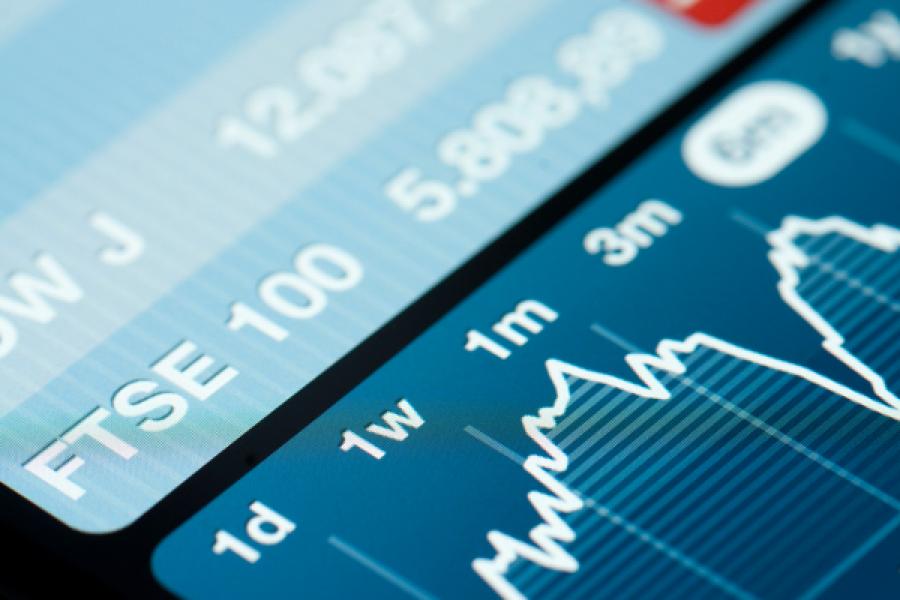Best and worst FTSE 100 shares in the first quarter of 2020
Winners in the index were scarce in the first quarter, but five companies posted positive performance.
3rd April 2020 10:34
by Tom Bailey from interactive investor
Share on
Winners in the index were scarce in the first quarter, but five companies posted positive performance.

The past quarter was an eventful one for the FTSE 100. The spread of coronavirus sparked a sell-off that pushed the blue-chip index into bear market territory for the first time since the fallout of the 2008 financial crisis. Year-to-date the index has lost 27.3%, up to the end of March.
Russ Mould, investment director at AJ Bell, notes that while over the past couple of weeks there’s been some signs of a recovery it is not clear if markets are yet out of the woods. He notes: “Even a big rally in late March could not salvage much for investors, who have also begun to suffer dividend cuts galore and encounter a steady but growing trickle of company fundraisings, and it is as yet unclear whether that was merely a classic ‘bear trap’ or the start of the markets finding a bottom. Only time will tell.”
- Invest with ii: Top UK Shares | Share Prices Today | Open a Trading Account
Top five
Winners in the index were scarce in the first quarter, with just five companies posting a positive performance.
Four of the five with positive returns all did so due to a perception of them as safe havens. For instance, a rise in the gold price over the past couple of weeks helped precious metal miners Polymetal (15.4%) and Fresnillo (4.2%). As Mould notes: “Gold is often seen as a port in storm during crises and the metal also began to make ground as central banks began to slash interest rates and conjure up new quantitative easing schemes and government’s threw fiscal caution to the wind by launching support programmes that will massively increase existing deficits.”
Hikma (2.2%) and Reckitt Benckiser (0.3%) also saw positive performance, albeit moderate. In the case of Reckitt Benckiser this was due increased demand for its cleaning products. As Mould notes: “Reckitt Benckiser’s production of Dettol and other household cleaning and consumer healthcare brands gave the firm a certain appeal during these troubled times.” Meanwhile, Hikma Pharmaceuticals was seen as having a business model that should be relatively unaffected by an economic downturn.
The other share that rose was Pennon, the water utility company, which is considered by investors as a defensive stock, given it has reliable customer income and dependable dividends.
| Stock | Sector | Capital return since 1 January 2020 |
|---|---|---|
| Polymetal | Mining | +15.4% |
| Pennon | Gas, Water & Multi-Utilities | +5.9% |
| Fresnillo | Mining | +4.2% |
| Hikma | Pharmaceuticals & Biotechnology | +2.2% |
| Reckitt Benckiser | Personal Goods | +0.3% |
| FTSE 100 | -27.3% |
Bottom five
There was no shortage of losers in the index. Broadly, the worst performers were cyclicals – companies expected to do worse in a recession. However, among the top five were those directly impacted by the coronavirus lockdown.
For instance, easyJet and International Consolidated Airlines were among the worst performers, losing 59.9% and 65.6% respectively. Mould says: “These have been hard hit by the collapse in passenger travel, and also freight, as more and more countries have gone into lockdown or self-imposed quarantine.”
Cruise ship operator Carnival posted the worst performance, with a loss of 73.1%. The company has had to cease all its cruise operations due to coronavirus. While there are early indications that bookings for 2021 are relatively strongly, there is concern that the virus could hurt demand for cruises for a while into the future.
Another poor performer has been Melrose Industries, with a loss of 61.9%. According to Mould, the company’s acquisition of GKN in 2019 left it heavily exposed to the automotive industry. The industry has been one of the hardest hit since the start of the coronavirus pandemic.
British Gas-owner Centrica was also among the five worst performers, with a loss of 57.4%. According to Mould: “February’s full-year results lived down to very low expectations, ratings agency Moody’s downgraded its view of the company’s debt and chief executive Iain Conn stepped down earlier than planned.”
| Stock | Sector | Capital return since 1 January 2020 |
|---|---|---|
| Centrica | Gas, Water & Multi-Utilities | -57.4% |
| easyJet | Travel & Leisure | -59.9% |
| Melrose Industries | Automobiles & Parts | -61.9% |
| International Consolidated Airlines | Travel & Leisure | -65.6% |
| Carnival | Travel & Leisure | -73.1% |
| FTSE 100 | -27.3% |
FTSE 100 in Q1 2020 Thursday 2 April 2020. Source: Refinitiv data.
This article was originally published in our sister magazine Money Observer, which ceased publication in August 2020.
These articles are provided for information purposes only. Occasionally, an opinion about whether to buy or sell a specific investment may be provided by third parties. The content is not intended to be a personal recommendation to buy or sell any financial instrument or product, or to adopt any investment strategy as it is not provided based on an assessment of your investing knowledge and experience, your financial situation or your investment objectives. The value of your investments, and the income derived from them, may go down as well as up. You may not get back all the money that you invest. The investments referred to in this article may not be suitable for all investors, and if in doubt, an investor should seek advice from a qualified investment adviser.
Full performance can be found on the company or index summary page on the interactive investor website. Simply click on the company's or index name highlighted in the article.